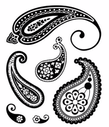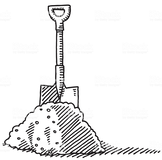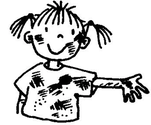 English abounds with toponyms – ideas, actions, or things named after places. I hope you enjoy considering this smattering of toponyms. Paisley – now a distinctive shape we print onto fabric, but originally a town in Scotland where such fabric was first made. Interestingly, the word paisley comes through Middle Irish from the word baslec, which came from the Latin word basilica, which means that the town was originally identified by its church. Today, the word babel refers to a confused medley of sounds, but originally it referred to Babhel, the capital of Babylon. Babhel is a Hebrew word that started out as Bab-ilu, an Accadian word meaning the gate of God, which causes those of my generation to wonder what Ricky Riccardo was really singing about. Our modern colors burgundy & magenta are both toponyms. Burgundy was originally a region in France named in Late Latin with the term Burgundiones, which translates to highlanders. In time, the wine of the area picked up the name, and the deep hue of the wine gave us the word burgundy as it refers to color. On the other hand, the town of Magenta was where the Sardinians & French teamed up to fight the Austrians during the Second Italian War of Independence in 1859. The town was originally named after Marcus Aurelius Valerius Maxentius. It wasn’t until a few short years after the battle that a deep reddish purple dye was discovered in that region, and voila, magenta. Even in the 13th century some folks (well, royalty, anyway) enjoyed relaxing at the spa. Our modern word spa is a toponym taken from Spa, Belgium, a town blessed with mineral hot springs. The town’s name came from the Walloon word espa, which meant spring or fountain. Because many of New York’s financial institutions ended up situated along the wall that once offered defense to the struggling Dutch town of New York, the adjacent street was named Wall Street. That struggling little town has done all right for itself to the point that we now use this toponym to refer to the entire American financial world. My niece & nephew used to refer to those lovely plastic playgrounds some fast food restaurants offer as king cities. Any of you here in California will easily fill in the etymology on that one. In the meantime I’m hoping you’ll use the comments section to suggest new toponyms we should insert into the language. My thanks go out to this week’s sources: OED, Fact Index, Wordnik, & Etymonline
0 Comments
 Some word pairs are confusing because they sound alike but have different meanings (like the ones in last week's post). Some word pairs are confusing because we've made them that way. Two bits of confusion involve the word pairs form/from & definitely/defiantly. In my humble opinion, the from & form confusion is a matter of typing more than a homonym issue. We just get typing away & muck it up. The confusion between definitely & defiantly, however, is another matter altogether. I’ve been grading English papers since the 1970s, & in my experience, these two words were never confused before computers. The confusion didn’t even exist with the first raft of word processors. I call this phenomenon a spellcheck-induced error. It occurs because many of us type definAtely instead of definItely. Our spell-checker “reads” our intentions & comes up with defiantly (which contributes to some hysterical sentences). Almost all forms of dessert/desert came to English through French. Dessert came to English in the 1500s in reference to the last course of a meal. The French word it came from is deservir, which translates to un-serve (because serving the last course involved clearing the table of the previous courses). The wasteland meaning of desert came to English in the 1200s from Old French, which came from the Late Latin word desertum, which meant thing abandoned. It wasn’t until the 1700s that tdesert began to mean a waterless, treeless region. The desert which means suitable reward or punishment (as in getting one’s just deserts) came through French from the Latin word deservir (not to be confused with the afore-mentioned French word deservir). It meant to serve well. I suppose one is served well by getting what one deserves. But so much for nouns – the verb desert came through the Old French deserter in the 1300s from the Latin desertare (closely related to desertum), which meant to abandon. This particular desert is built of the word parts de-, meaning opposite or undo, & serere, meaning to put in a row. Serere also gave birth to the word series. We’ll finish this post with by, bye & buy. By has been around since Old English was born. By came from a Proto-Germanic word meaning about, near, or around. Though we pronounce it differently today, we find by’s sister (with the same meaning) at the end of place names that end in –by. In Yorkshire alone there are over 210 place names ending this way (Wetherby & Selby, for instance). Our modern word buy, came from another Proto-Germanic source, the word bugjan, meaning to pay for. When it first entered English, the soft g sound remained at the end of the word, & is one of the reasons buy's past tense form, bought includes the letter g. The completely unrelated word bye is a shortening of good-bye, which in the 1570s was spelled godbwye and was interestingly a shortening of something else -- the term God be with ye. Thanks for joining me for another Wordmonger post. Please leave any comments in the comments section. My thanks go out to this week’s sources: OED, Place Names in England, Wordnik, & Etymonline  Lately I've been pondering whether nearly everyone in the news is a fool, or whether I'm the fool for spending my timer reading about them. Fool has been around in English for a long time. The noun form of fool showed up in the 1200s & the verb form appeared about a century later. It came from fol, an Old French term for idiot, rogue, jester, or madman. The French got it from the Latin term follis, literally meaning leather bag or bellows & figuratively meaning empty-headed person or windbag. Though one might imagine the antics of court jesters inspired the word, centuries of jesters gave their collective all before the English term fool was applied to their ilk in the late 1300s. In 1680 the term April fool was born. On All Fool’s Day people were sent on “false errands” (did those Brits have a crazy sense of humor or what?). Interestingly, the Norse had a similar celebration known as April Gowk (gowk meant cuckoo in Norse). Some words that share fool's root include: follicle fun fond bold (no fooling) Though most of the following words have multiple meanings, they are all also synonyms for fool: gorm berk schmoe schmuck schlemiel simpleton fop muggins patch putz moppet dodo sot nincompoop gawp gowk ninny coot naïf What have you to say about all this etymological tomfoolery? My thanks go out to this week’s sources: Merriam Webster, OED, Etymonline, & Wordnik  This week we’ll bark up the tooth tree. Big thanks again to my dear friend River, who inspired last week’s eyetooth post in the first place. Tooth gave birth to all sorts of great words & idioms. Sweet-tooth showed up as early as the 1300s. Bucktoothed showed up in the 1540s. Snaggle-toothed appeared in the 1580s. To be long in the tooth appeared in 1841. The fabric we call houndstooth showed up in the early 1900s. The word toothache has been in use since Old English, toothpick showed up in the 1400s, & toothbrush found its way into the language in the 1600s. Tooth has been with us since Old English, It was born of the Proto-Indo-European word dent-. Yes, both dental & tooth have the same root, but along the way different languages & cultures heard the sounds differently & morphed them differently, ending up with words that don’t sound vaguely related. Given tooth’s roots (sorry about that), it should be no surprise that the following words are related to tooth: trident (1400s) three teeth indent (1400s) to give something a jagged or toothed appearance dandelion (1400s) literally tooth of the lion indenture (1400s) of the raggedy edge – when the practice of indentured servitude began, the contract between “employer” & “employee” would be ripped in half in a toothed or jagged fashion, each piece going to one of the parties. Years later, the two pieces were compared as proof of identity so that the contract’s agreement could be fulfilled. dentist (1700s) tooth person periodontal (1800s) around the teeth orthodontia (1800s) straight & proper teeth denture (1800s) set of teeth mastodon (1800s) Okay, so we usually dig up bones & teeth of old critters, right? Apparently each mastodon molar was equipped with a central bump, & apparently our intrepid, lonely, mostly male paleontologists were a bit too lonely (& worked up) so voila! breast-teeth. rodent (1800s) you don’t want to know the details, but they have to do with scraping, red, & teeth al dente (1900s) to the tooth Tusk appears to have made its way to Old English through Old Frisian, also from the Proto-Indo-European root dent-. What toothsome etymology do you find most worth of biting into? Please leave a comment. My thanks go out to this week’s sources: Merriam Webster, OED, Etymonline, & Wordnik  Who wouldn't 't be intrigued by words like tidbit & morsel? Tidbit showed up in English in the 1630s, made up of tid, meaning fond, solicitous or tender, and bit, which appeared in English in the 1200s, meaning a piece bitten off. The English got morsel from the French word morceau, meaning small bite, portion or helping, some time around 1200. Interestingly, the word mordant, meaning caustic (a figurative sense of biting), shares the same roots. Smidgen came from smitch, a Scottish word meaning a very small amount, or an insignificant person. Smidgen entered English in the 1800s. Dollop made its way into English in the 1570s, from the East Anglian word, dallop, meaning a tuft or clump of grass. It wasn’t until 1812 that the meaning morphed to a lump, serving or blob. Both jot & iota came to English in the 1630s from Greek. Iota is the smallest letter of the Greek alphabet, & (in Greek) also denotes anything small. An alternate spelling was jota, thus the word jot. The Greeks got the root word from a Semitic language we’re not entirely sure of, but the original root was probably something like the modern Hebrew word yodh. In the early 1950s, Korean War veterans brought home to America the word skosh, their version of the Japanese word sukoshi, meaning few, little, or some. In 1877, a small child might have been referred to as a tad. Etymologists are moderately sure tad was a shortened form of tadpole, which was born of the word tadde, an alternate form of toad. Toad came to English in the 1300s from nobody-knows-where, & was added to the Middle German word poll, meaning head to make tadpole. It wasn’t until 1915 that tad began to mean a small bit. Which of these morsels intrigues you most? Please leave a comment. My thanks go out to this week’s sources: Collins Dictionary, OED, Etymonline, & Wordnik  The English word head has its unlikely origins in the Proto-Indo-European word kaput. Somehow, as kaput made its centuries-long voyage through German, Dutch, Saxon and/or Frisian to Old English, it morphed to heafod. From Old English it moved into Middle & Modern English, where it managed to drop a syllable & become head. Along the way it collected dozens of idioms, including: 1200s – head count (applied to people) 1300s – headwaters 1300s – headstrong 1500s – head count (applied to cattle) 1680s – head of a coin 1680s – head on a mug of bear 1748 – head on a ship (toilet) 1911 – hophead, which became in time, pothead 1952 – heads up 1972 – head game 1984 – headbanger & dozens more. Because head has changed so much since it started out as kaput, it has a steaming heap of unlikely cousins, all from that same Proto-Indo-European root. Here is a sampling: capital caput madcap cabbage capo chief scalp cap capsize chef captain cob achieve capillary cadet decapitate cape cephalic mischief precipice handkerchief corporal chieftain capitulate Many connections to the head are obvious. Others, not so much. Might any of you have a hare-brained theory as to how some of these words are related to the head? Please leave your thoughts in the comments section. My thanks go out to this week’s sources: OED, Etymonline, Collins Dictionary, & Wordnik  I find it fascinating that the Latin word humus, meaning of the earth, is the root of human. Though I suppose it’s reasonable to expect Mother Earth would be pretty darned good at giving birth, not only the humans, but to words. In the early 1400s the Latin word humare (a verb form of humus meaning to bury), linked with the prefix ex- made its way into English as exhume, meaning to unearth. I’ll leave it to the sociologists to explain why modern usage continues to embrace the grisly word exhume, but has - for the most part - forgotten the kinder, gentler term, inhume, to put into the ground (which entered English two centuries later). Though Genesis I couldn’t possibly lead to this, it’s no surprise – given the Genesis II telling of creation – that the Hebrew equivalent of humus, adamu, became the name Adam. Humus & adamu admittedly aren’t cognates, but they both mean of the earth, & both have many offspring. Camomile has its roots in humus & means apple of the earth. Camomile entered English in the late 1300s through French & Latin, originating in Greek chamaimelon. Also from humus, chameleon came to English in the mid-1300s, through French & Latin, originating in the Greek term khamaileon, meaning lion of the earth, which most likely comes from a species of chameleon whose crest resembled a lion’s mane. Another Latin offspring of humus was the word humilis, meaning lowly or humble, giving us images of the lowly folk prostrating themselves before the mighty, literally on the ground. In the 1300s, humilis gave us the English words humble & humility. By the 1530s, these words gave birth to the noun humiliation, which in turn, gave us the verb, humiliate. Good readers, please comment on all of this humus-ness, or possibly on Oscar Levant’s commentary on humility: “What the world needs is more geniuses with humility, there are so few of us left.” My thanks go out to this week’s sources: the OED, The Quotation’s Page, Wordnik, Merriam-Webster, & Etymonline.  The word dirt came to English through Middle English (drit or drytt, which meant mud, dirt or dung) originating in the Norse word, drit. Back in the 1300s it was also used figuratively to make fun of people. The word dirty was born some two centuries later (originally dritty to match its Middle English kin). Though dirty originally meant muddy, dirty or dung-covered, by the 1590s it had grown to also mean smutty or morally unclean. When compared with its synonym soil, dirt is one of the myriad words that reflects a prejudice against Germanic, Anglo-Saxon & Norse terms in favor of Latin and Greek (due in part to the events following the Battle of Hastings). We English speakers generally consider soil (from the Latin word solium or solum) to be a classier person’s term for that lowly, horrible word dirt. I have a fascination with this prejudice & expound on it here. But, back to dirt. In the 1670s, English speakers could pull dirty tricks on one another. By 1764, we could ask someone to do our dirty work. By 1821 the term dirt cheap was born. In the 1850s the mining trade gave us the literal term paydirt. By 1873 that term had become figurative, meaning profit or success. It wasn’t until 1926 that dirt picked up the meaning gossip, This usage was introduced by none other than Ernest Hemingway. Though dirty looks have been going on for centuries, we didn’t call them that until 1926. And in 1932 the term dirty old man was born, to be artfully portrayed by Arte Johnson as Tyrone F. Horneigh a mere 40 years later. Please, good followers, leave a thought regarding Tyrone F. Horneigh & his unrequited love for Gladys Ormphby, or maybe say something about dirt. My thanks go out to this week’s sources: Collins Dictionary, the OED, Wordnik, & Etymonline.  Etymology is all about sleuthing back to the origin of words. Sadly, even the most hardworking teams of etymologists reach the end of the sleuthing line still asking the word history equivalent of, “Who’s your daddy?” When a word’s parentage is in question, it's in the dictionary is listed as “origin unknown.” This week’s post will cover just a few of the many orphans in the world of words. Pooch was first recorded in 1924. Though a few word historians believe pooch may have some relationship to the word pouch, this American-born synonym for dog has never been officially nailed down. In 1809 the word hike showed up in English (spelled hyke). It meant to walk vigorously. Hike has no known origin, though at the time the similarly parentless word yike carried the same meaning. Pokey, meaning jail or prison was first recorded in 1919. Some etymologists have suggested it may have come from pogie – an 1891 term meaning poorhouse, but like pokey, pogie is of unknown origin. Hanker – as in “I’ve got a hankerin’ for possum stew” – first showed up around 1600, & though it probably came from the Dutch word hunkeren (to hanker), hunkeren is also of unknown origin. Arbor, arboreal, arboretum & arborist all originate in the Latin word arbor, meaning tree, & showed up in English in the 1500s, but the Latin word arbor is an etymological mystery. Squeamish showed up in English in the mid-1400s, meaning disdainful or fastidious. Its Anglo-French parent word escoymous is of unknown origin. Scare showed up in English in the 1590s meaning to frighten. It came from the Norse word skirra, to frighten, shy from, shun, prevent or avert. Skirra is a form of the Norse word skjarr, meaning timid, shy or afraid of. Skjarr has no known parent. About 1600 the verb rant showed up in English, meaning both to be jovial & boisterous, & to talk bombastically. It comes from randten, a Dutch word of unknown origin meaning to talk foolishly or to rave. I find the nearly opposite original meanings of the last two words remarkable. Fellow word-folks, were any of these word orphans worthy of your remark? My thanks go out to this week’s sources: Collins Dictionary, the OED, Wordnik, & Etymonline.  What’s Etymosheeple, you ask? It’s explained here. After our last exciting round of Etymosheeple, ending on the word adolescent Rachel6 of Sesquipedalian Dreamer contacted me, noting that she’s always associated the words adolescent & nascent, so nascent will be our next stop this round (thanks, Rachel6). Nascent arrived in English in 1620 from the Latin word nascentum, meaning immature, arising, or young. Nascentum comes from the Latin word nasci, or to be born. What other words also come from nasci? A smoking heap of them. Obvious ones associated with birth include: natal (late 1300s) neonatal (1883) Renaissance (1840s – I would’ve guessed earlier) Not-so-obvious ones include: cognate, meaning of common descent. Though the words springing from nasci in this list are broadly related cognates, cognates are typically more closely related (like the French nuit, German nacht & English night). But wait, there are more... nee, as in Jacqueline Kennedy, nee Onassis) innate, as in innate talents Noel, as in Christmas native, nation & nature And my favorite of the bunch, puny, which entered English in the 1570s, meaning inferior in rank, from the Middle French word, puisné, which came from Latin that I’ll simplify as post-nasci, meaning after being born. Thinking Etymosheepishly, the word puny leads me to wonder about other words meaning small (teeny, tiny, teensy), & whether they owe their –y endings to nasci, (as puny does) or to the more traditional diminutive –y ending we find in puppy orbaby. And the answer is….maybe. It turns out both teensy (1899) & teeny (1825) are alternative forms of tiny (1400), which appears to have come from the word tine, (as in the tines of a fork), and may have been formed by adding the diminutive-making –y to the word tine, but nobody knows for sure. Thanks for joining me for this particularly directionless round of Etymosheeple. This week in the comments section, I’d love to see words with unlikely spellings. Mention one, mention two, mention a dozen… My thanks go out to this week’s sources: the OED, Wordnik, & Etymonline. |
I write for teens & tweens, bake bread, play music, and ponder the wonder of words in a foggy little town on California's central coast.
To receive weekly reminders of new Wordmonger posts, click on "Contact" & send me your email address. Archives
November 2023
|


 RSS Feed
RSS Feed